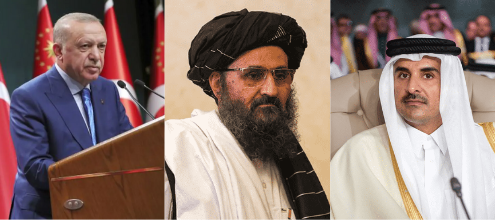-
Turkish President Erdogan told the press that he wishes to establish diplomatic ties with the Taliban.
-
Qatar, a longstanding ally of the Taliban’s top political leader Mullah Abdul Ghani Baradar, is also looking to establish its strong political presence in Afghanistan.
-
But, this time around, the Arabs are more than willing to keep away with the Taliban.
The power game in Kabul has just begun. The Taliban had been fighting to take over Afghanistan over the past years. Now, as the Taliban ensconces itself in Kabul, bigger powers like Turkey, Qatar, Pakistan and China have begun battling for their greater influence over the ruling militant group. The Afghan crisis has handed over the Qataris and Turks a fortunate moment to establish themselves as an influential power in South Asia. Their longstanding enmity towards Arabs is another major factor driving their Afghan policy in favour of the Taliban.
On August 27th, the Turkish President Recep Tayyip Erdogan told the press that his country is willing to establish diplomatic ties with the Taliban as its embassy returns to its building in Kabul. Turkey has already begun engaging the Taliban in diplomatic talks. “We have held our first talks with the Taliban, which lasted three-and-a-half hours,” the Turkish leader said, adding: “If necessary, we will have the opportunity to hold such talks again.”
Qatar, a longstanding ally of the Taliban’s top political leader Mullah Abdul Ghani Baradar, is also looking to establish its strong political presence in Afghanistan. Qatar has always treated Baradar with the utmost regard and is hopeful to wield greater influence over him to set its footholds in the South Asian region. Qatar has been hosting Baradar for the past three years and, he is now slated to be the new head of Afghanistan.
Read More: Saudi Arabia and Russia prepare Iran as a bulwark against China-Taliban nexus in Afghanistan
However, much to the Taliban’s dismay, the diplomatic support has not poured in from the Gulf States. Arabs have tacitly distanced themselves from the Afghan affairs in the last few years, owing to several reasons. Saudi’s foreign policy is now not driven by its theological ambitions, rather by its economic ambitions. Moreover, Arabs had to distance themselves from the Taliban after al-Qaeda, a terrorist group close to the Taliban, which carried out a horrendous terrorist attack of 9/11 in the US that prompted the Americans to wage a 20-years long war in Afghanistan.
When the Taliban 1.0 rose to power in Afghanistan in 1996, the Arabs vehemently threw their weight behind the group to expand their influence in the war-torn country. The Gulf States were the critical provider of finances as well as human resources for the Mujahideen fighting in Afghanistan against the Soviet Union between 1980 and 1989. Various analysts believe that the Gulf region, primarily Saudi Arabia, provided nearly “US $4 billion in aid to the Mujahideen between 1980 and 1990, which excluded unofficial aids from Islamic foundations, charities, private funds from Princes, and mosque collections.
That was the era when Saudis would look into Afghanistan through a theological lens. Arabs wielded immense sway over Pakistan as they aspired to increase their footprints in the region using the same. It was in May 1997, when Saudi Arabia and the UAE became one of the few countries to officially extend their recognition of the Taliban’s ‘Islamic Emirate of Afghanistan.’
But this time around, the Arabs are more than willing to keep away with the Taliban. Instead, they are emanating soft signals of supporting the pro-Afghanistan hold out of the Taliban owing to their increasing proximity to Moscow. For instance, the Arabs vowed to support “Afghan people” after the militant group took over Kabul. Moreover, the UAE also housed the Afghani President Ashraf Ghani, who had to run for cover after Kabul went into the Taliban’s hands.
Qatar and Turkey want to fill this glaring void in the Taliban-ruled Afghanistan, and thus, they are going all out to forge stronger ties with the new rulers in Afghanistan. Turkish President Erdogan wishes to revive the Ottoman-era glory of the Turkish state by projecting himself as the new Caliphate of the Islamic world. Hence, Turkey wants to materialize its ambitions of setting up a new Islamic world order by wielding considerable dominion over the Islamic Emirate of Afghanistan. Turkey desires to form a parallel Islamic bloc lead by its highly ambitious president; however, views Saudi Arabia as an impediment to its aspirations.
On the other hand, Qatar also has an axe to grind with Saudi Arabia and the UAE. Qatar is considered a terrorism sympathizer by these Arab states. In June 2017, both the UAE and Saudi Arabia imposed a blockade against their Gulf Cooperation Council (GCC) partner Qatar, owing to Doha’s support for the likes of the Muslim Brotherhood and what Riyadh and Abu Dhabi, in general, considered the Qatari leadership punching above its weight in regional affairs.
So, by extending its unconditional support to the Taliban, Qatar could be eying to set its footholds in the South Asian region. Turkey and Qatar could also reconcile their efforts in propagating the idea of setting up a parallel Islamic bloc to challenge Saudi Arabia’s undisputed hold over the Islamic countries. The Taliban has come as a silver lining for Erdogan’s dying dreams of rejuvenating the glorious past of the Ottoman Empire. Hence, the Afghan crisis could eventuate into a greater clash between the Arab powers and an implicit alliance of Qatar and Turkey; and this may very well plunge the region further into chaos.
